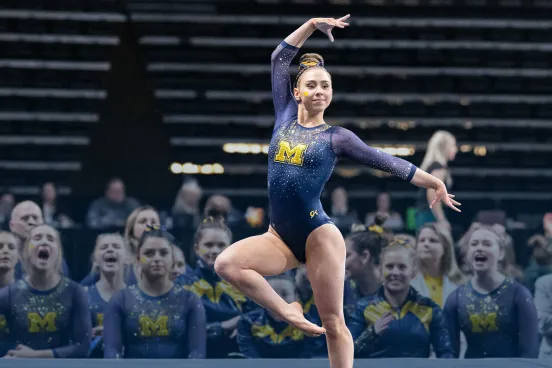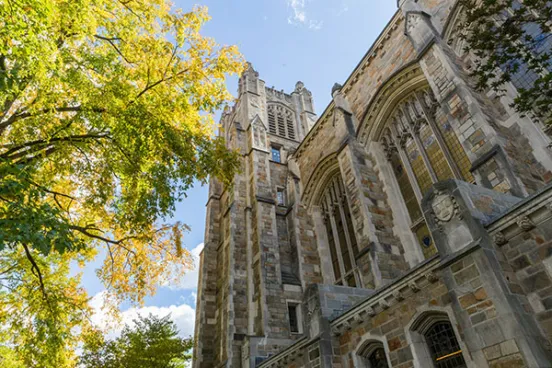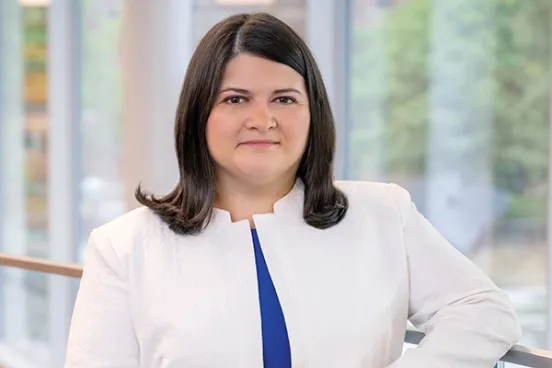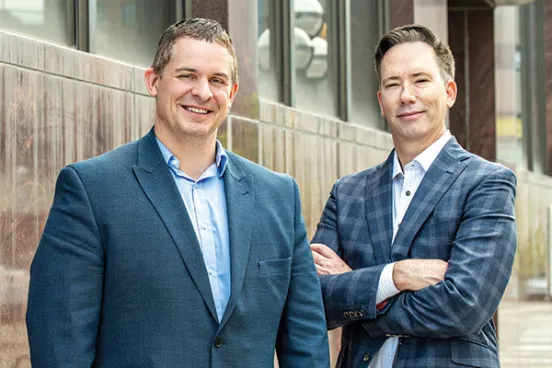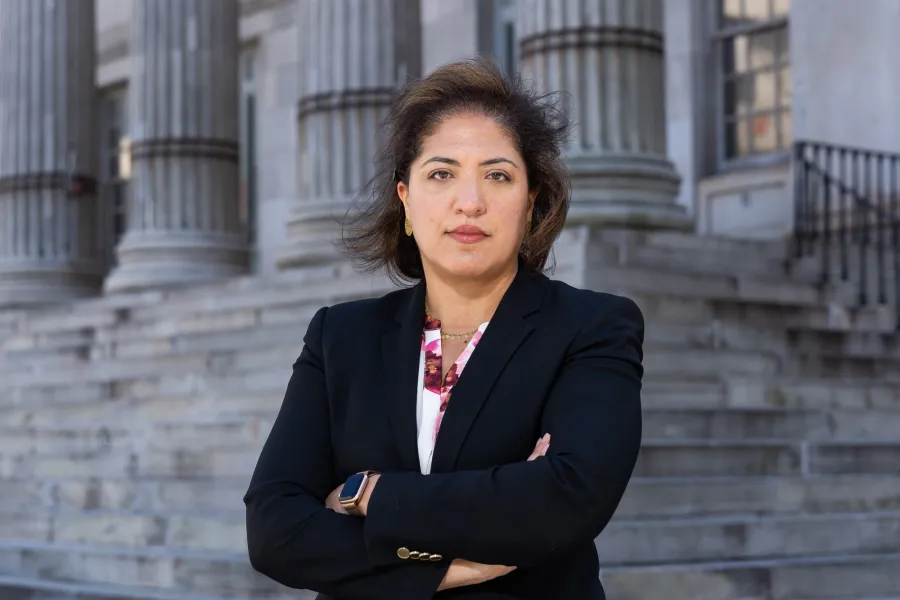
It’s not surprising that the chief of the Organized Crime and Gangs Section in the US Attorney’s Office for the Eastern District of New York (EDNY) would charge someone with racketeering.
What surprised many people in 2019 was who was being charged and why.
The section chief at the time, Nadia Shihata, ’03, had taken down drug dealers, an Albanian crime boss, and other nefarious characters. This time, she and a team of prosecutors were leveling charges against Robert “R.” Kelly, an R&B superstar.
The team (which, coincidentally, was led by three women) charged Kelly with racketeering, not for what most people think of when they think of racketeering—money laundering, extortion, and so on—but for crimes including sexual exploitation of children, kidnapping, and forced labor.
The approach seemed innovative to some experts and risky to others. Shihata, however, knew it was the best chance of bringing down a sexual predator who had operated across state lines for years, growing ever more brazen as he victimized girls as young as 14.
“He was operating like he was untouchable. And local authorities dealing with one act here and one act there couldn’t go after or establish the full breadth of his conduct to show the patterns and the methods of coercive control that he used with his victims and the people in his enterprise,” Shihata says.
“Some argued our tactic wouldn’t work, but in our mind, this was exactly what the racketeering statute was developed for: a recognition that the people around R. Kelly enabled him to commit these crimes. They made him much more powerful and able to get away with what he was doing for so long.”
A superstar and a collective blind eye
Kelly rose to mainstream superstardom in the mid-1990s when he won three Grammys for his song “I Believe I Can Fly” and was nominated for another for “You Are Not Alone,” recorded by Michael Jackson. He was the most commercially successful male R&B artist of the era.
The public’s eyebrows were raised in 1994 when Kelly married his protege, Aaliyah, a rising R&B star with whom he had worked for about three years. He was 27; she was said to be 18. The marriage soon was annulled, Kelly’s and Aaliyah’s careers moved on, and so did the public’s thirst for scandal.
Kelly’s personal life again came into the spotlight in 2002, when he was indicted in Chicago on child pornography charges stemming from his sexual relationship with a 14-year-old girl. Again, the news was more of a sigh-and-eye-roll moment among the general population. South Park wove him into an episode; comedian Dave Chappelle made a parody video. Kelly finally stood trial in 2008 but was acquitted.
What people didn’t fully understand then, Shihata says, is that Aaliyah and the teenager at the center of the charges in Chicago were victims hiding in plain sight. And there were plenty more where they came from.
Building a racketeering case against a sexual predator
Like most of us, Shihata was disturbed by the allegations of physical and sexual abuse that came to light in the 2019 documentary Surviving R. Kelly. But unlike most of us, she thought she might be in a position to do something about it.
Shihata had supervised prosecutors who brought racketeering charges against sex offender Keith Raniere and others involved with his cult, Nxivm. (Raniere was convicted in June 2019.) She also had prosecuted two lieutenants and a prison guard in 2017 for sexually abusing inmates at the Metropolitan Detention Center in Brooklyn.
“I had worked with victims of sexual abuse and knew how to do trauma-informed interviews,” Shihata says. So when the chief of the EDNY’s Civil Rights Section asked if she wanted to join the R. Kelly prosecutorial team, “I said, ‘Absolutely.’”
They began working with a group of investigators from the US Department of Homeland Security (DHS) who specialize in sex trafficking investigations. The first step was to find a victim in New York. They also worked to find someone within Kelly’s circle. One lead revealed another, which led to another. And slowly, methodically, they built their case.
“We figured out pretty early that it made sense to tackle it as a racketeering case,” Shihata says, “because the statute allows you to prosecute criminal conduct throughout the country. And the statute of limitations allows you to go back in time much farther than under other criminal statutes.”
That meant Kelly’s marriage to Aaliyah, some 25 years earlier, could play an important role in the government’s case.
Aaliyah died in a plane crash in 2001. But the DHS investigators learned that a Kelly representative had bribed an official to lie about her age at the time they applied for a marriage license. The bride-to-be had been 15, not 18. “It showed how other members of Kelly’s enterprise enabled the conduct back then and moving forward,” Shihata says.
In July 2019, just seven months after launching the investigation, Shihata’s office filed an indictment that included nine predicate acts of racketeering involving kidnapping, forced labor, and the sexual exploitation of a child, as well as Mann Act violations for coercing and transporting women and girls across state lines to engage in illegal sexual activity.
“It was a massive undertaking,” Shihata says. “And we uncovered much more than we were able to present at trial, either because victims didn’t want to testify or we didn’t feel we could prove beyond a reasonable doubt.
“Doing this kind of work, you get to the point where nothing you uncover surprises you anymore. But at the same time, you’re still surprised.”
Prosecuting a still-popular star
One of the reasons that Shihata became a federal prosecutor is that she was drawn to the drama and excitement of a courtroom. When Kelly’s COVID-delayed trial finally began in August 2021, though, most of the drama was outside.
Since COVID protocols prohibited Kelly’s fans from being in the courtroom, they gathered daily on the sidewalk. And while Shihata and her co-prosecutors received threats, she says she was especially concerned for the victims dealing with online and in-person harassment.
“That takes a toll on people and makes them not want to participate. And that's the purpose, right? To obstruct the investigation.”
Before the trial began, Shihata’s office brought charges against three men for criminal conduct against Kelly’s accusers. One committed arson and attempted arson. Another was charged with stalking, and the third attempted to bribe a witness not to cooperate.
“We brought these cases because obviously criminal activity shouldn't be happening, but also to send a message to the hundreds of other people doing similar things that there are consequences for intimidating witnesses and attempting to obstruct justice,” Shihata says.
She describes the trial as a slow build with plenty of painful victim testimony woven with insiders’ perspectives of how Kelly’s enterprise operated. “From Maria's [Cruz Melendez, a co-prosecutor] opening statement, we tried to very deliberately sketch out why this was racketeering, why this was a criminal enterprise. We laid it out, step by step, in plain English that the jury could understand,” Shihata says.
By contrast, “the defense's arguments were so mismatched for the time we were in, and I said that in my rebuttal. It was as if we took a time machine back to a courthouse in 1950, with tactics of blatant victim blaming. It was just shameful, honestly. And, thankfully, it didn’t work.”
Moving on
In June 2022, Kelly was sentenced to 30 years in prison for his conviction in the Eastern District of New York. Three months later, he was found guilty of three counts of sexual exploitation of a child and three counts of coercion and enticement in the US District Court for the Northern District of Illinois.
That same month, Shihata ended her nearly 12-year career as a federal prosecutor and—with another member of the prosecutorial team, Liz Geddes—opened a New York-based law firm, Shihata & Geddes LLP. They specialize in civil rights and sexual misconduct matters, internal investigations, wrongful convictions, and criminal defense.
“We wanted to continue work in the sexual misconduct and abuse space. We also wanted to represent victims,” Shihata explains. “And we wanted to do wrongful conviction work because as former prosecutors, we know how these cases are built. It’s important that our practice be centered on cases we care deeply about.”
When she thinks back on the biggest case of her career, she feels relieved for the victims while praising how the culture has shifted: “Today we recognize that a grown man having sex with an underage girl is abuse. It's exploitation. It’s not okay.”


